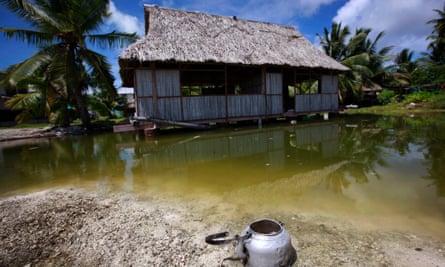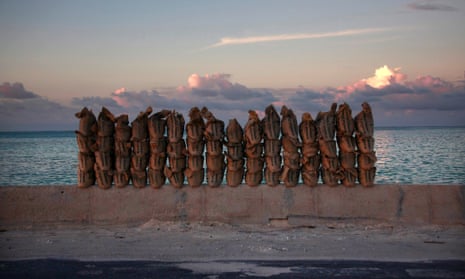No refugees please, we’re New Zealanders. That’s the message from New Zealand’s court of appeal. In a decision released last week the court endorsed earlier rulings that Ioana Teitiota – a Kiribati national – is not a climate change refugee. Teitiota, his wife and their children will be deported to Kiribati, where the court believes they can “resume their prior subsistence life with dignity”.
Even if the Teitiota’s can reclaim some dignity, climate change will take it from them. The IPCC projects that the Pacific ocean will swallow most Kiribati by the end of this century. Life in Kiribati is life against the clock. There’s little dignity in that.
But before Kiribati sinks beneath the sea, ocean creep will make the islands uninhabitable. Sea level rise – coupled with more intense storm cycles – will contaminate the water table, pollute the small pockets of agricultural land and destroy homes and businesses. Tarawa, the main atoll, is a tiny sandstrip some six square miles in size. There is, quite literally, no escaping the misery climate change will cause.
The conditions for social unrest are manifest and the I-Kiribati know it. Density means disease and unrest spread quickly. There are 50,000 people tightly packed on Tarawa. The president, Anote Tong, is exploring options for mass migration.

The idealist in me hoped the court of appeal would create an option for that mass migration. The realists on the court wouldn’t have a bar of that. Teitiota was not a refugee under 1A(2) of the refugee convention. The court conceded Teitiota was a refugee under a “sociological definition”, but not the legal definition.
The court approached the case as a threshold question: was “there a real chance of the refugee claimant being persecuted” and, if so, was “there a convention reason for that persecution”? Teitiota couldn’t satisfy the test.
The court took the orthodox position that persecution is primarily political and internal. There had to be a “violation” of human rights and a “failure” of state protection. Teitiota’s claim turned that definition on its head.
In essence, his claim held that the violation and failure was on the part of the international community. The persecution was external, not internal, and environmental, not political.
The decision reveals – in all its misery - the protection deficit in international law. A judicial decision is an uncodified statement of power relations. Never could there be a more unequal power relationship than here: on one side, the I-Kiribati and their sinking home, on the other the rigid machinery of international law. If Lord Diplock is right, then “law is about man’s duty to his neighbour”. That principle should underpin our approach to climate change and forced migration.
But the law doesn’t encompass all of our moral obligations. It’s clear that the international system isn’t fit for purpose. Let’s look past it to social resistance and political solutions. Science, as Naomi Klein argues, “is telling us to revolt”. Ordinary people need to put pressure on their governments to deal with climate change displacement. The missing link isn’t some new legal rule, but mass action.
The history of the Pacific is a history of isolation, both physical and political. It’s that isolation that allowed the great powers to commit economic and military misadventures in the region, from depleting phosphate stocks in Kiribati and Naura to nuclear testing in French Polynesia and the Marshall Islands.
The social history of the Pacific is one of migration, from the early Austronesian and Polynesian expansions to the recent European settler migration. How can we say no to refugees when we are all migrants ourselves?
